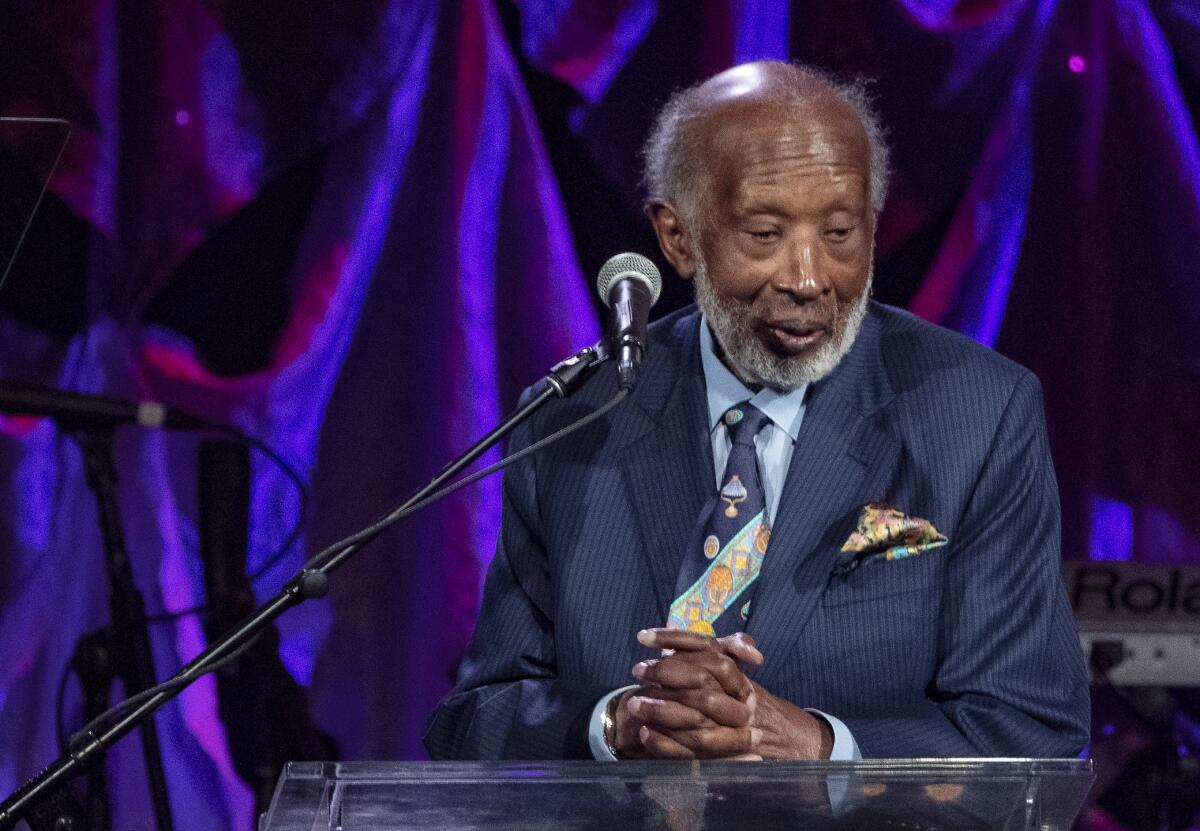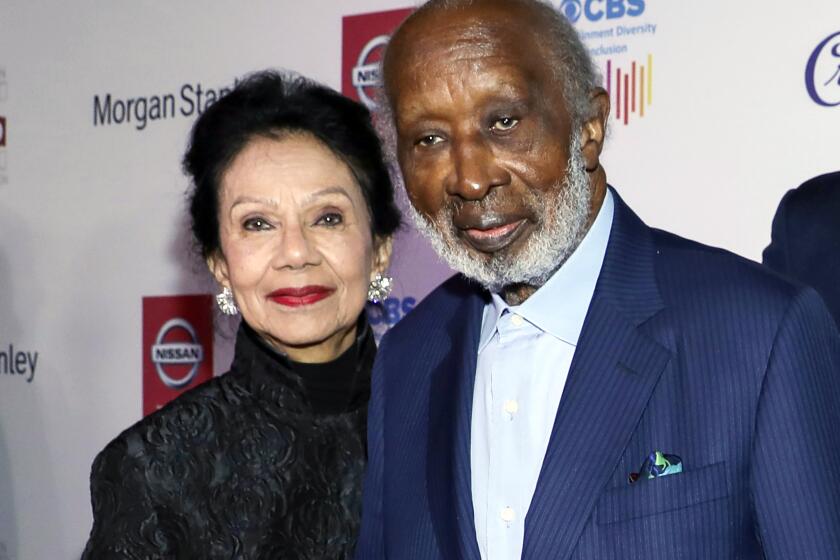Clarence Avant, the ‘Black Godfather’ of the recording industry, dies at 92

- Share via
Clarence Avant was gruff. He was, by all accounts, foul-mouthed and plain-spoken. But he lived a life that was about opening doors, finding talent, making connections, striking deals, solving problems and getting people the money they were worth.
Avant took care of people — Black people especially but not exclusively — and got them headed in the right direction. And despite working in the music industry, the movie business and politics, he lived his life everywhere but in the spotlight.
A consummate deal closer whose power reached from Hollywood to the White House, Avant “passed away gently at home” on Sunday, according to a Monday statement to The Times from his children, Alex and Nicole Avant, and his son-in-law Ted Sarandos. He was 92.
“Through his revolutionary business leadership, Clarence became affectionately known as ‘The Black Godfather’ in the worlds of music, entertainment, politics, and sports. Clarence leaves behind a loving family and a sea of friends and associates that have changed the world and will continue to change the world for generations to come. The joy of his legacy eases the sorrow of our loss,” the statement said.
Avant died less than two years after his wife, philanthropist Jacqueline Avant, was fatally shot at the longtime couple’s Beverly Hills home.
If your currency as a documentary subject lay in the number of heavyweights taking time to sing your praises on camera with twinkles in each one’s eyes, then music industry executive Clarence Avant may be, like George Bailey in “It’s a Wonderful Life,” the richest man in town.
“[Avant’s] tools are his ability to manipulate people, and I don’t mean that in a bad way,” singer-songwriter Bill Withers — whom Avant discovered and managed — said in “The Black Godfather,” Netflix’s revealing 2019 documentary about Avant’s life. “And if he needs to do it in a bad way, he’s probably good at that too.”
Born in Greensboro, N.C., in 1931 and raised in a nearby town named Climax, Avant was the oldest of eight children. He didn’t really know his birth father and didn’t make it past ninth grade. The Ku Klux Klan was all around, as were his mother’s warnings about how to stay safe.
“We were poor, man. I’m talking about poor, poor, poor,” he said. His nickname was Sweet Potato because that’s what he brought in his school lunch each day instead of a sandwich.
They were humble beginnings for a man who would later go on to sleep in the Lincoln Bedroom in the White House after helping Bill Clinton become president, fully established as a behind-the-scenes titan of managing, deal making and problem solving across the full spectrum of Black entertainment.
A serious clash with his violent stepfather when he was a young teen prompted Avant to move to New Jersey to live with an aunt who had been the first in the family to move north. He never looked back.
He got an office job in New York City, but by 1959 was managing Teddy P’s Lounge in Newark, N.J., a city then filled with jazz clubs. At one of them, he met talent manager Joseph G. Glaser, founder of the Associated Booking Co. and Louis Armstrong’s longtime manager. Avant learned the music business from Glaser, who was alleged to have ties to the organized crime figures behind much of the post-Prohibition nightclub scene.
“I don’t ask Mr. Glaser questions,” Avant said in Netflix’s documentary. “I just learn.”
He was pushed to be an agent but chose to be a manager instead, eventually taking on clients such as R&B singer Little Willie John, jazz singers Sarah Vaughan and Dinah Washington, jazz organist Jimmy Smith and Argentine pianist-composer Lalo Schifrin, who played with Dizzy Gillespie.
He used his contacts in the jazz clubs to impress Jacqueline Gray, a model from Queens, N.Y.
Clarence wooed Jacquie with limo rides and entry to New York clubs such as Birdland and the Apollo Theater, and in 1967 when they got married, she became Jacqueline Avant. The couple raised two children and would remain together for 54 years, until her violent death in an apparent home invasion robbery.
The man who murdered philanthropist Jacqueline Avant during a burglary at her Beverly Hills home is sentenced to more than 150 years in prison.
The way Avant told the story, Glaser ordered him to Los Angeles to help grow Schifrin’s presence as a soundtrack composer for movies and television. The composer, who wrote the “Mission: Impossible” theme, would go on to do more than 100 films with Avant as his manager.
The Avants looked for a house when they got to Southern California. They searched first in Baldwin Hills, a largely Black neighborhood until Glaser told Avant that Beverly Hills was where he should live — a destination he couldn’t afford until Glaser lent him the money.
Working with Schifrin, Avant introduced himself to every studio head in town. He also learned the value of a copyright when he entered the music publishing industry as well, creating Sussex Records — its name a mashup of the words “success” and “sex” — as 1969 turned into 1970 and Motown gradually moved from Detroit to L.A.
Soon, Avant met Withers, who had been laid off from an aircraft manufacturing job and was hoping to make it as a musician. After hearing Withers’ demos, Avant signed him to Sussex. Ever the connector, Avant teamed him with Booker T. Jones to create “Just As I Am,” Withers’ debut album. It featured the now-classic “Lean on Me,” which Avant selected as the album’s first single.
“He puts people together, and they do what they do,” Withers, who died in 2020, said in the Netflix documentary.
In 1971, Avant created Avant Garde Broadcasting, and the company bought the license of an Inglewood radio station that was one of the country’s first Black-owned broadcasters.
Though moved as a young man by the racially motivated killing of Emmett Till in 1955, Avant early on avoided any involvement in the growing civil rights movement. Then he connected with Danny Bakewell, whose company now owns the Los Angeles Sentinel newspaper. Bakewell explained the movement as one in which Black people were helping one another help themselves, and Avant could relate.
In 1973, Avant executive-produced the film “Save the Children,” which documented a concert he helped pull together as part of the Rev. Jesse Jackson’s 1972 Operation Push Black Expo in Chicago. Performances by top Black artists including Withers, the Jackson 5, Marvin Gaye, Sammy Davis Jr., Isaac Hayes, the Temptations and Roberta Flack were interspersed with footage of children in dire conditions around the world. The soundtrack was released by Motown, though the talent came from all three top Black-music labels at the time: Motown, Stax and Atlantic Records.
Avant turned star running back Jim Brown of the Cleveland Browns into a movie star — making him the first Black actor to have a love scene with a white woman (Raquel Welch, in 1969’s “100 Rifles”). He reached out to Hank Aaron to coordinate a Coca-Cola endorsement before the baseball legend broke Babe Ruth’s home-run record in 1974. He produced a prime-time network special that helped Muhammad Ali transition from retiring boxing star to beloved entertainment figure, insisting that ABC hire the same Black director, Stan Lathan, who had directed “Save the Children.”
Avant also helped pave the way for the entertainment industry’s Black community to come together with local and national politicians. He put together a star-studded concert for Andrew Young when the civil rights icon was running for Congress in 1972.
Later he would pull Hollywood together to support Jimmy Carter’s presidential run, hosting the candidate’s first major fundraiser. Fundraising events became a way of life in the Avant household. Years later, he would raise money for Bill Clinton, becoming good friends with the future president and urging him not to give in when his presidency was in jeopardy.
“I think Clarence is somebody who cared about politics because he recognized that economic progress, cultural progress, social progress, political progress are all tied together,” former President Obama told Netflix. It was Avant who got Obama’s landmark speech at the 2004 Democratic National Convention moved to prime time and into the national consciousness.
By the mid-’70s, though, Avant had overextended himself and his businesses hit the skids. Withers left for Columbia Records after Avant couldn’t pay him and, facing tax liens that sparked an IRS raid, Sussex shut down. Avant Garde Broadcasting went bankrupt a few months later, and Avant suddenly found himself in perilous financial trouble with no easy solution in sight.
But when he finally let word of his situation slip, powerful friends in the music industry came to his aid. “Little help from this friend and that friend, and in time we just pulled through,” Jacquie Avant said in the Netflix documentary.
Then it was back to business as usual.
In 1979, Avant opened Tabu Records. Across the 1980s and ’90s, he scored platinum success with R&B acts such as the S.O.S. Band, Alexander O’Neal, Cherrelle and Kenny “Babyface” Edmonds. He brought in “Jimmy Jam” Harris and Terry Lewis of the Time as producers of the S.O.S. Band — encouraging them in their first meeting to ask for more money in their deal. He also mentored the songwriting-production team of Babyface and L.A. Reid and was essential when they made a deal for their own label under Clive Davis’ Arista Records. That label signed TLC, Toni Braxton and Outkast.
There were other name-dropping achievements as well: He promoted Michael Jackson’s monumental 1987 “Bad” world tour and partnered Harris and Lewis with a young Janet Jackson, resulting in her career-making 1986 album “Control.”
With success after success, Avant assumed the persona of the “Black Godfather,” the man who knew everybody, the go-to guy whose advice helped younger Black executives and performers get ahead.
“If you don’t ask, you don’t get. Life is about one thing: numbers. Nothing else,” he said in the Netflix documentary. “What did Tina Turner say? ‘What’s love got to do with it?’ Not a f— thing, man.”
In 1993, he was named chairman of Motown Records, using the money from his three-year deal to pay off his mortgages and pay back the friends who helped when he was down. “Free at last,” Avant said. Later he would become the first Black board member at PolyGram.
His influence touched a remarkable range of artists. Snoop Dogg credited Avant with steering him toward “a stance of peace” when he was having trouble with Death Row Records’ Suge Knight. Sean “Diddy” Combs said bluntly in the documentary, “Clarence makes sure you don’t get f—” by the entertainment industry.
“Clarence is a guy who wasn’t looking for the job he ended up with,” entertainment magnate David Geffen said in the film, adding later, “I don’t know how he made money. He never seemed to charge anyone.”
The Avants’ son, Alexander, is an entertainment executive, and their daughter, Nicole, is a film producer who is married to Sarandos, co-chief executive and chief content officer at Netflix. After supporting Obama’s first presidential campaign, Nicole was named U.S. ambassador to the Bahamas. The Avants flew to Washington in 2009 to watch her be sworn in.
Clarence Avant was honored with a star on Hollywood’s Walk of Fame in 2016, with Withers, entertainment executive Irving Azoff, Jamie Foxx, “Jimmy Jam” Harris and Terry Lewis, and lifelong friend Quincy Jones doing the honors. Lionel Richie helped induct him into the Rock & Roll Hall of Fame in 2021.
A month later, Jacqueline Avant was fatally shot by an intruder in their hillside home — the same home they had nearly lost so many years before — in the early hours of Dec. 1, 2021. A suspected burglar was later convicted of murder and sentenced to 150 years in prison.
“There will never be another Clarence Avant,” Ludacris told Netflix. “However, his goal is to plant seeds so that there can be individuals just like him.”
Times staff writer Nardine Saad contributed to this report.
More to Read
The biggest entertainment stories
Get our big stories about Hollywood, film, television, music, arts, culture and more right in your inbox as soon as they publish.
You may occasionally receive promotional content from the Los Angeles Times.












